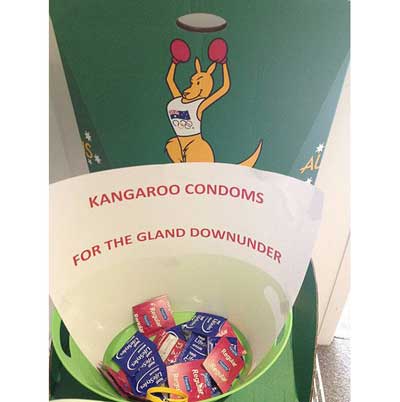 |
|
London Olympic organizers are investigating how a bucket of Australian-tagged condoms found its way into the athletes' village. |
|
London Olympic organizers are investigating how a bucket of Australian-tagged condoms found its way into the athletes' village without official consent. Australian BMX cyclist Caroline Buchanan tweeted a photograph from the athletes' village of a container of condoms with a placard reading "Kangaroos condoms " with the picture of a boxing kangaroo. She joked that the container seemed to back up rumors that the athletes' village becomes a hot bed of activity as thousands of competitors complete their events and celebrate after years of working to get to the Olympics. "Haha, the rumors are true. Olympic village," tweeted Buchanan, whose BMX contest starts on Wednesday. Barcelona started the trend of supplying free condoms to athletes when the Spanish city held the Olympics in 1992, with the International Olympic Committee (IOC) endorsing the move to help AIDS awareness and prevention. The handouts came with health information. The London Olympic organizers, LOCOG, have provided 150,000 free condoms in dispensers for the 10,800 athletes at the Games. They are supplied by Durex, part of British consumer goods group Reckitt Benckiser, which paid for the supply rights. A LOCOG spokeswoman said they were trying to find out who distributed the so-called Kangaroo condoms, with the container shown to hold condoms from Durex rivals Ansell Ltd, an Australian company and Pasante, a private British company. She said athletes and officials were allowed to bring products into the village for their personal use. "We will look into this and ask that they are not handed out to other athletes because Durex are our supplier," said the spokeswoman. Organizers tightly control which brands can be promoted at the Games, striking sponsorship deals with a limited number of companies and trying to stop non-sponsors from getting free publicity on the back of the Olympics. Lawrence Boon, managing director of Pasante, said his company had no involvement with the distribution of condoms in the athletes' village and he suspected it was a prank by the Australian team. The number of condoms supplied at London tops the 100,000 made available to athletes in Beijing four years ago. (Read by Rosie Tuck. Rosie Tuck is a journalist at the China Daily Website.) (Agencies) |
伦敦奥组委正在调查,澳大利亚生产的一批避孕套是如何未经官方许可就被带进了奥运村。 澳大利亚自行车越野赛选手卡洛琳-布坎南在奥运村里用推特发布了一张照片,照片上是一桶避孕套,上面还有一张拳击袋鼠的照片,写道:“袋鼠避孕套”。 布坎南开玩笑说,这个盒子似乎证实了运动员村已经成为性派对的温床这一传言,成千上万的运动员结束了比赛,在数年辛苦的奥运训练后开始狂欢。 “哈哈,谣言是真的,奥运村。”布坎南在推特上说。她参加的自行车越野赛从周三开始。 1992年西班牙巴塞罗那奥运会开创了给运动员免费提供避孕套的潮流,国际奥委会对此表示支持,称这是为了帮助人们关注并预防艾滋病,而且还附赠健康信息。 伦敦奥组委为奥运会的10800名运动员提供了15万个免费避孕套,可以在自动售货机领取。避孕套由英国消费品集团利洁时旗下的杜蕾斯公司提供,该集团为此供应权支付了费用。 奥组委的一位女发言人表示,他们将调查是谁分发了所谓的“袋鼠避孕套”,因为盒子里面的避孕套来自杜蕾斯的竞争对手、澳大利亚的安塞尔公司和英国私营企业帕桑特。 她还表示,运动员和官员可以将产品带进奥运村,供个人使用。 她说:“我们将对此展开调查,并要求不把这些避孕套分发给其他运动员,因为杜蕾斯是我们的供应商。” 奥组委严格控制哪些品牌可以在奥运会中出现,与有限的数家公司签订赞助合同,并阻止非赞助商的标识在奥运会上得到免费的宣传。 帕桑特公司的总经理劳伦斯-布恩表示,公司与奥运村的避孕套分发事件无关,他还怀疑称这是澳大利亚代表队的恶作剧。 伦敦奥运会提供的避孕套数量已经突破了四年前北京奥运会的10万只。 相关阅读 (中国日报网英语点津 Julie 编辑:陈丹妮) |
|
Vocabulary: hot bed: 温床 strike: 达成(协议),签订(合同等) |
